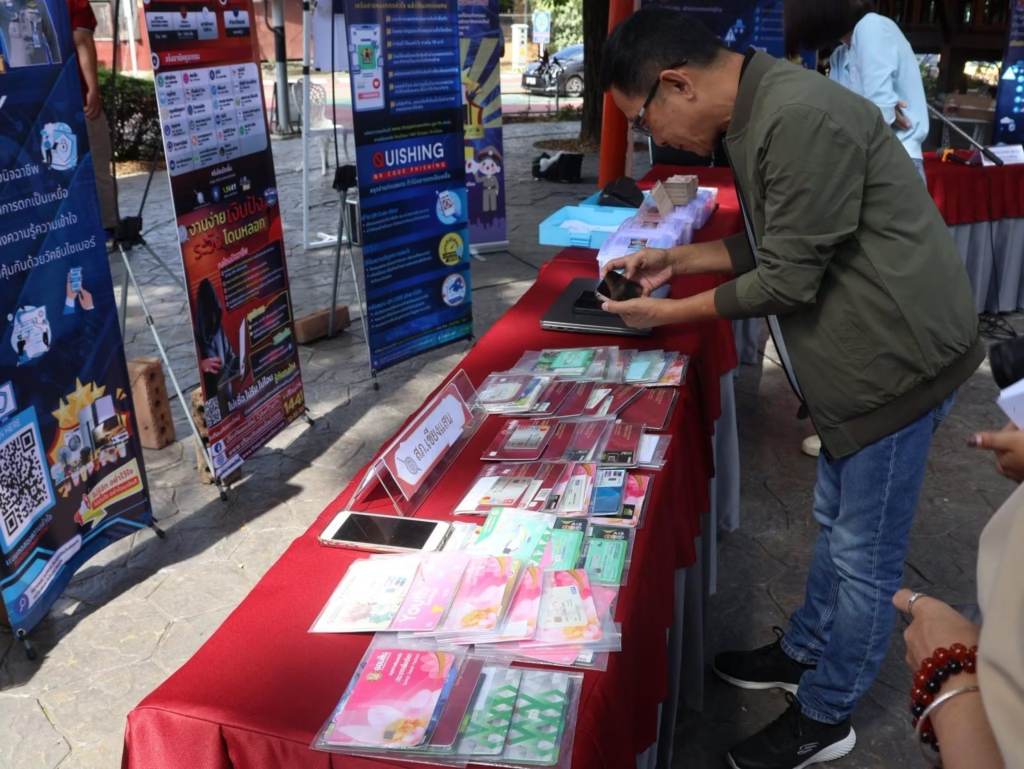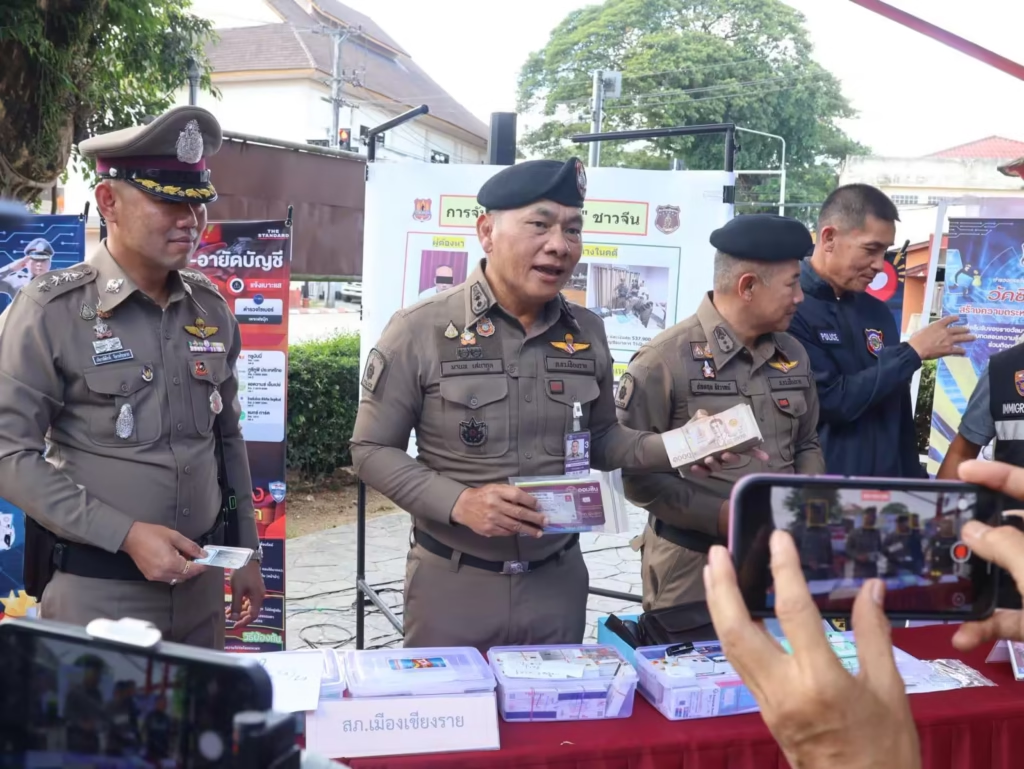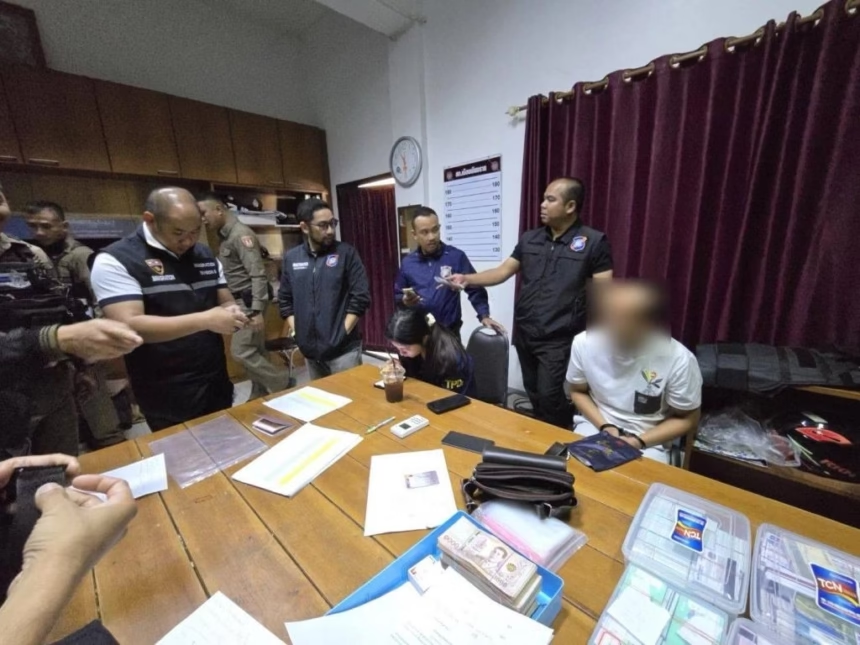CHIANG RAI – On Friday, Police announced the arrest of a Chinese man with 2,057 ATM cards, which he used to make cash withdrawals across the city, to withdraw 537,900 baht in cash. Police suspect he is linked to a large network.
Pol Maj Gen. Manop Senakul, Commander of Chiang Rai Provincial Police, told reporters the suspect was identified as a Chinese National, Mr. Hu Haojie, age 35. Police seized an iPhone 14 in blue, a blue vivo phone, a silver Lenovo laptop, 2,057 ATM cards, 537,900 baht in cash, and other related evidence.
Pol Maj Gen. Manop said the arrest took place on 23 October 2025 at approximately 12:04 a.m. A patrol from Mueang Chiang Rai Provincial Police Station was checking the area near Bangkok Bank on Thanalai Road, Wiang Subdistrict, Mueang Chiang Rai District, when they noticed a Chinese man acting suspiciously.

When approached, he tried to flee, but officers detained him. A search found ATM cards from multiple banks and several transfer slips.
Officers took him in for questioning, then searched his accommodation, where they found large volumes of evidence: 2,057 ATM cards from various banks, two mobile phones, one laptop, cash totalling 537,900 baht, and documents listing names and card numbers.
Under interogation, the suspect stated he withdrew and transferred money on orders from a Chinese man who contacted him via the Lark app, which points to a cybercrime network.
Police charged him with possessing electronic cards of others without authorization for use in a manner likely to cause harm to others or the public, and with arranging, advertising, or spreading information to buy, sell, rent, or lend bank accounts or electronic cards for use in technology-related crimes. He was handed over to investigators to proceed with legal action.
In a second case, Chiang Saen Police received a tip that bank passbooks, electronic cards, and SIM cards would be smuggled through a private delivery company for onward transport to Laos, with parcels held at a vehicle drop-off near the Golden Triangle checkpoint in Chiang Saen District.

Officers set up surveillance and saw a private courier deliver parcels, which were collected by a man named Rungrut. Police identified themselves and searched the parcels, finding numerous passbooks, electronic cards, and SIM cards. Officers expanded the search and seized more parcels of the same type from private delivery firms in the area.
Pol. Maj. Gen. Manop said this network is tied to the covert shipment of accounts and cards to “Grey Chinese” groups in Laos, used by scam gangs to defraud the public. Chiang Rai Provincial Police will expand the investigation and move to seize assets in line with government and national police directives.
He said the arrest of the Chinese suspect with 2,057 ATM cards in Mueang Chiang Rai, along with the seizure of ATM cards and passbooks in Chiang Saen, shows the operation is large in scale. He praised officers from both stations for their checks and trusted sources that led to the arrests.
The offenders appear to be around 30 years old. In the Chiang Saen case, the suspect worked as a paid parking attendant in the border area, taking on extra jobs before the arrest. Police will pursue all involved parties to disrupt money laundering and stop scam operations.
He added that many people, not only in Chiang Rai but across the country, still fall for scams due to common human risks. SMS links and social media tricks cause heavy losses. Authorities will step up public education to build a stronger line of defence against fraud.

The Golden Triangle region, particularly in parts of Laos and Myanmar adjacent to the Thai border, has become the operational base for expansive Chinese-led organized crime syndicates running industrial-scale online scam centres, often referred to as “fraud factories.”
Lured by false promises of high-paying jobs, tens of thousands of people from across Asia, including many Chinese and Thai nationals, are trafficked and held captive in fortified compounds like Myanmar’s KK Park near Myawaddy or the Golden Triangle Special Economic Zone in Laos.
Victims are forced under threat of severe torture, including beatings and even organ harvesting, to run sophisticated scams like “pig butchering” and cryptocurrency fraud, extracting billions of dollars globally.
Despite recent high-profile crackdowns and arrests by Chinese, Myanmar, and Thai authorities, including cutting power and repatriating thousands of trafficked workers. These criminal operations, protected by local militias and leveraging tools like satellite internet, continue to thrive and pose a persistent humanitarian and security challenge right on Thailand’s doorstep.
Related News:
Police Take Down a Chinese Scam Network in Bandu, Chiang Rai














